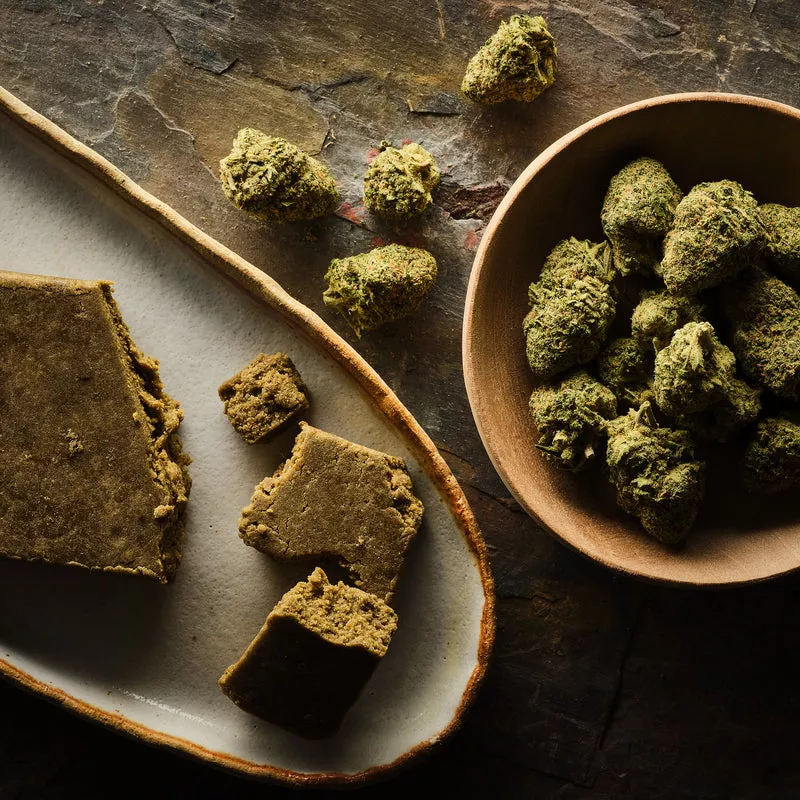- Shop All
- Type
- (144) THC>
- (75) CBD>
- Need
- Sleep>
- (21) Pain>
- (10) Anxiety>
- (6) Pets>
- (88) Edibles
- (14) CBD Edibles>
- (60) THC Edibles>
- (3) Ratio Edibles>
- (33) Hybrid Edibles>
- (87) Vegan>
- (5) Beverages>
- Strain
- (29) Indica>
- (24) Sativa>
- (47) Hybrid>
- (14) Tinctures
- (5) Anxiety Tinctures>
- (9) CBD Tincture>
- (1) Pain Tincture>
- (4) Ratio Tincture>
- (4) Sleep Tincture>
- (4) THC Tincture>
- (4) Capsules
- (1) CBD Capsules>
- (0) THC Capsules>
- (3) Ratio Capsules>
- Foggers
What Are The 3 Types Of CBD?
Olivia St JamesJanuary 18, 2022LatestContents
As CBD's popularity grows in Canada, more people are happy to provide anecdotal evidence that CBD has helped them alleviate chronic pain, anxiety, depression, and other health issues.
Many vegan people find that CBD oil products can align with their diet and vegan values while benefiting from various CBD forms like vegan CBD chocolate, gummies, vegan CBD capsules, tinctures, and more.
While there are many CBD vegan forms to select from, there are vital descriptions in CBD labels that can help you decide which CBD product to buy. For example, there are “ 3 types of CBD,” and each one can provide you with information about its effects and the relief that it can provide.
Let's look at what these 3 types of CBD are, how they differ, which one is more effective, and how to read CBD product labels to better picture what you're getting.
What should I find in a CBD Label?
When going through the variety of CBD products found nowadays, especially if you follow a diet like a vegan one or avoid specific allergens, reading the label is the first step when looking at a product.
Suppose you buy vegan CBD capsules, vegan CBD protein powder, or any other vegan CBD products. In that case, the following information should be clear and easy to read on the label, helping you determine the right product for you:
- Amount of total CBD in the product. You will see in big numbers how much CBD is in the product. This number is expressed in milligrams and can help you determine the strength of or how much CBD per serving you are getting.
- Strength of the product. You can know the product’s strength by dividing the size of the bottle ( in the case of a tincture) by the total amount of CBD in the product, and this can help you determine how much CBD you are getting per serving.
- Serving size. Knowing the serving size can also help you determine how many times you will be taking that particular product to accomplish your health goals. Or if it is easy to change the serving size to adapt it to how you feel each day.
- List of ingredients. Looking up any additional ingredients in a CBD product, especially if you follow a vegan diet, is vital to make sure it is 100% vegan and does not include any other ingredient that you might find yourself allergic to. Or you can also find ingredients that are excellent choices for what you are looking to accomplish. For example, a vegan CBD chocolate made with just dark chocolate and no sugar might be just what you are looking for to provide you with high energy during the day.
- Product Type: Isolate, broad-spectrum, or full-spectrum are the 3 types of CBD. Each type of CBD oil can tell you if it has terpenes, flavonoids, and other cannabinoids like THC in the formula, and you can determine if this aligns with your health goals.
On this last point, people find themselves confused with the product type and wonder, what is isolated, broad, or full-spectrum? You might find yourself asking the same question, so let's see the difference between each one, so next time you're looking up vegan CBD products, you know with clarity which one is the best for you.
CBD Oil “Types”
CBD is abundant in the hemp plant, and the parts of the plant used to extract CBD oil are the flowers, stems, and leaves (the aerial part of the plant).
After the aerial part of the plant goes through an extraction process, either through distillation or a more popular and preferred method of CO2 extraction, a process of purification begins to obtain a full-spectrum CBD oil.A full-spectrum CBD oil will contain all the natural terpenes, flavonoids, and other cannabinoids, including THC ( less than 0.3%) from the plant.
CBD oil will go through a THC remediation process (chromatography) to obtain a Broad-spectrum CBD oil, where THC is removed.
A CBD Isolate oil is formulated when the desired end product only requires CBD. CBD Isolate is produced using a crystallization process; this CBD oil contains no terpenes, flavonoids, or other cannabinoids.
What Type of CBD oil is my best choice?
CBD, as a cannabinoid, works by interacting with the endocannabinoid system, found in all humans, including animals (mammals).
CBD interacts with CB1 and CB2 receptors, regulating or changing their response to other cannabinoids. CBD can also control enzymes that break down endocannabinoids like anandamide, allowing them to remain longer in the system and prolonging their benefits.
If you're searching for a CBD oil that contains a variety of benefits, a full-spectrum product is the way to go. The majority of the terpenes and cannabinoids in full-spectrum CBD remain intact during processing. When ingested, you benefit from the “entourage effect,” meaning that you can receive wider benefits when more cannabinoids, and other substances like terpenes and flavonoids, interact and work together.
One particular characteristic that full-spectrum CBD oil has is that one of the cannabinoids also present is THC.
THC has proven to provide broad benefits, and it can help relieve chronic pain, anxiety, and depression and help with neurological problems. THC attaches to receptors CB1 that are found mainly in the brain and nervous system, stimulating areas in the brain that can provide pleasure and raise dopamine levels.
Broad-spectrum CBD oil is an option for you to benefit from terpenes, flavonoids, and cannabinoids, except for THC.
A CBD Isolate is another option when looking to benefit just from CBD. This CBD oil is beneficial when a full-spectrum CBD oil is too strong for you, or if you want to pass a lab test, broad-spectrum and isolated products will be your option, as they will have no THC.
Isolate CBD oil has the advantage of having more CBD concentration in the formula. You can have more accurate results and monitor your effects with more detail.
Our Top Choice Canada Full Spectrum CBD Tincture
1 Birch + Fog | Full Spectrum CBD Tincture Day Time
Design for daytime, a full spectrum CBD tincture, that is vegan friendly and offers additional benefits of MCT oil, used as carrier oil for better CBD absorption.
Easy to take during the day to help relieve anxiety, depression, poor appetite, or any pain-related issue.
Birch + Fog offers a line of top-quality CBD oil, with CBD types: Isolate and full-spectrum CBD oils.
You can also benefit from our subscription program and receive your favorite CBD oil at a better price.
Pros
- High-quality full-spectrum CBD oil
- CO2 extracted
- MCT oil
- Available in a variety of strengths( 500 mg, 1000 mg, and 1500 mg)
- Vegan friendly
Cons
- Does contain THC in small percentages.
Highlights
- Birch + Fog provides high-quality full-spectrum CBD oil tinctures and minimal refinement, preserving terpenes, flavonoids, and cannabinoids so that you can benefit from the synergy of the compounds naturally found in the hemp plant.
Endnotes
Whether it´s a vegan CBD tincture, a CBD vegan chocolate, or vegan CBD gummies, you can find different types of CBD infused in different kinds of CBD products, and it is essential to read the labels to determine if it's the right choice for you.
Here at Birch and Fog, we provide you with CBD full spectrum and CBD Isolate oil in a variety of delicious and convenient products that we hope will suit your needs and provide you with the relief that you so much need.0/5 (0 Reviews)Latestfrom B+FBe the first to know about exciting new products, special events, seasonal offers, and much moreOur Collective
Wellness to your doorstepCopyright © 2024 All Rights Reserved | BIRCH + FOG[gtranslate]Save your cart?
x










